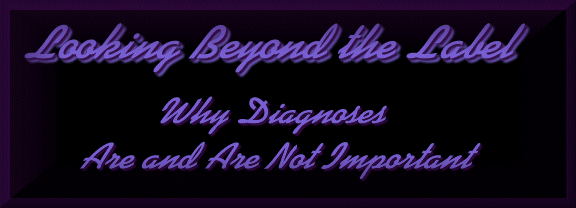

Besides medication questions, the most often question that gets asked is "Does this sound like depression to your?" or "Is this schizophrenia?" Important questions to ask and have answered. But not for the reasons you might think.
![]() Diagnoses in the behavioral healthcare field have often had an overemphasis placed
on them by some professionals and laypeople. It is not clear to me why some people
are so interested in finding and obtaining the right label for their disorder, since
these labels -- by their very definition -- are only broad categorizations that tell us
very little about the unique human being behind them. Nor necessarily how best to treat them
for any given disorder.
Diagnoses in the behavioral healthcare field have often had an overemphasis placed
on them by some professionals and laypeople. It is not clear to me why some people
are so interested in finding and obtaining the right label for their disorder, since
these labels -- by their very definition -- are only broad categorizations that tell us
very little about the unique human being behind them. Nor necessarily how best to treat them
for any given disorder.
![]() Take someone suffering from depression for the first time. A serious, debilitating mental
disorder which has its roots in biology, the psychological makeup of the person, and
their social relationships with others. It is a much more complex disorder than some
doctors believe, who try and treat it only addressing one of these three components.
Even then, the doctor doesn't take a careful psychosocial and medical history to
ascertain which treatment works best for you! He or she takes the history, and then
picks a treatment that the doctor is most familiar with. Sounds backwards, doesn't it?
So, for instance, if a psychiatrist is most comfortable and familiar with prescribing
Prozac and Zoloft, guess what most patients who come to him or her will receive?
It isn't because either of these medications may be the best for you out of the 2 dozen
antidepressant medications are available to doctors today. It is because the doctor
wants to prescribe them to you.
Take someone suffering from depression for the first time. A serious, debilitating mental
disorder which has its roots in biology, the psychological makeup of the person, and
their social relationships with others. It is a much more complex disorder than some
doctors believe, who try and treat it only addressing one of these three components.
Even then, the doctor doesn't take a careful psychosocial and medical history to
ascertain which treatment works best for you! He or she takes the history, and then
picks a treatment that the doctor is most familiar with. Sounds backwards, doesn't it?
So, for instance, if a psychiatrist is most comfortable and familiar with prescribing
Prozac and Zoloft, guess what most patients who come to him or her will receive?
It isn't because either of these medications may be the best for you out of the 2 dozen
antidepressant medications are available to doctors today. It is because the doctor
wants to prescribe them to you.
![]() It gets even worse with psychotherapy. Most therapists are not trained in a wide array
of research-proven techniques nor necessarily have a great deal of experience in using them.
Instead, therapists find a modality or theory they like and identify the most with, and then
try and fit most people who come to see them into that one modality or theory. While most
therapists identify themselves as being "eclectic" (which means, theoretically, they use
whatever techniques will be most helpful for each person), in practice this is a difficult
thing to be. The eclecticism is nearly always based upon a singular theoretical stance
which is how the therapist conceptualizes most of the people she or he sees. Whether this
stance is really appropriate to your presenting problem or the type of person you are is
meaningless in many therapists' eyes.
It gets even worse with psychotherapy. Most therapists are not trained in a wide array
of research-proven techniques nor necessarily have a great deal of experience in using them.
Instead, therapists find a modality or theory they like and identify the most with, and then
try and fit most people who come to see them into that one modality or theory. While most
therapists identify themselves as being "eclectic" (which means, theoretically, they use
whatever techniques will be most helpful for each person), in practice this is a difficult
thing to be. The eclecticism is nearly always based upon a singular theoretical stance
which is how the therapist conceptualizes most of the people she or he sees. Whether this
stance is really appropriate to your presenting problem or the type of person you are is
meaningless in many therapists' eyes.
![]() Given this is the state of treatment today for the vast majority of practicing clinicians,
what difference, really, does the disorder's name make? Well, in terms of a socially-sanctioned
label, none at all. Whether you're depressed, anxiety-ridden, or grappling with obsessive-compulsive
disorder (OCD), society will treat you the same. In terms of research, it does help scientists to try and
discover the underpinnings of disorders and their most useful treatments. Yet, most of the research
produced to date shows unsurprising similiarities... SSRIs (a type of antidepressant medication) can
now be used to treat not only depression, but OCD, some personality disorders, and many other problems.
Cognitive-behavioral therapy works for a wide variety of disorders as does RET and interpersonal therapy.
So only in a broad sense do these labels help a clinician determine what is the most appropriate
treatment to begin you out on or to try first.
Given this is the state of treatment today for the vast majority of practicing clinicians,
what difference, really, does the disorder's name make? Well, in terms of a socially-sanctioned
label, none at all. Whether you're depressed, anxiety-ridden, or grappling with obsessive-compulsive
disorder (OCD), society will treat you the same. In terms of research, it does help scientists to try and
discover the underpinnings of disorders and their most useful treatments. Yet, most of the research
produced to date shows unsurprising similiarities... SSRIs (a type of antidepressant medication) can
now be used to treat not only depression, but OCD, some personality disorders, and many other problems.
Cognitive-behavioral therapy works for a wide variety of disorders as does RET and interpersonal therapy.
So only in a broad sense do these labels help a clinician determine what is the most appropriate
treatment to begin you out on or to try first.
![]() Where these diagnostic labels hurt the most is when people start identifying with them on
a more-than-passing level. Instead of saying, "I suffer from depression" much like one would
say, "I have the flu," many people turn these labels into "I am depressed, I have always been
depressed, I will never be anything other than depressed." "I have panic attacks and my life
is now defined by them." "I'm an obsessive-compulsive." "I'm borderline." No, you're not. You suffer
from a personality disorder called borderline which can mean you lead a mostly normal
life with an occasional period of stress and disharmony. By reducing the sum of our being down
to our diagnosis, our affliction, we risk losing what makes us unique individuals, what makes us
human.
Where these diagnostic labels hurt the most is when people start identifying with them on
a more-than-passing level. Instead of saying, "I suffer from depression" much like one would
say, "I have the flu," many people turn these labels into "I am depressed, I have always been
depressed, I will never be anything other than depressed." "I have panic attacks and my life
is now defined by them." "I'm an obsessive-compulsive." "I'm borderline." No, you're not. You suffer
from a personality disorder called borderline which can mean you lead a mostly normal
life with an occasional period of stress and disharmony. By reducing the sum of our being down
to our diagnosis, our affliction, we risk losing what makes us unique individuals, what makes us
human.
![]() People are not diagnoses, they are not labels. Diagnoses are important on a broad
spectrum, in the general picture, but they should never be the focus of one's definition nor
of one's treatment. It is an assessment question which, for most people, should be answered
relatively quickly in the first or second session of therapy. Then therapy and treatment takes
over and should be the focus.
People are not diagnoses, they are not labels. Diagnoses are important on a broad
spectrum, in the general picture, but they should never be the focus of one's definition nor
of one's treatment. It is an assessment question which, for most people, should be answered
relatively quickly in the first or second session of therapy. Then therapy and treatment takes
over and should be the focus.
![]() Look beyond the label and see the human being, the individual with so much potential and hope.
Look beyond the label and see the human being, the individual with so much potential and hope.